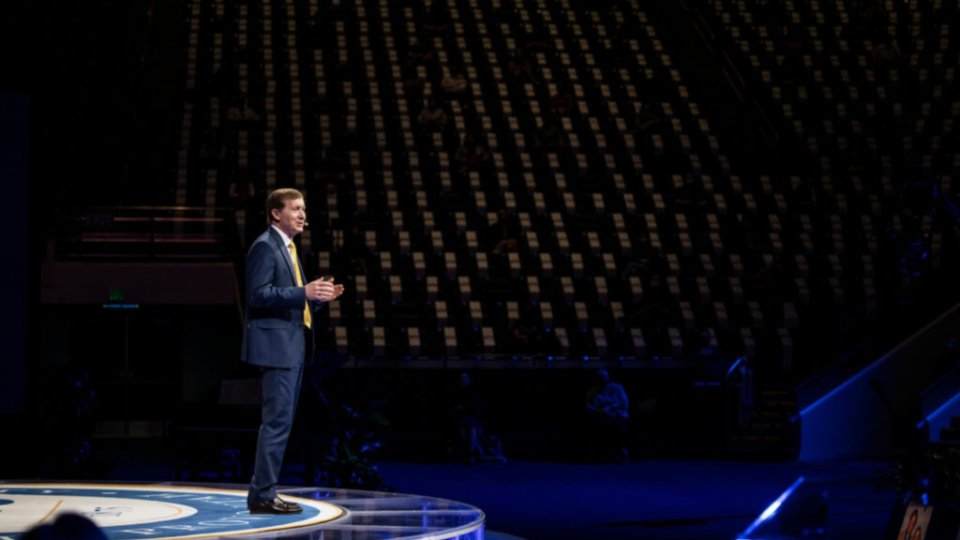| Temple Square is always beautiful in the springtime. Gardeners work to prepare the ground for General Conference. © 2012 Intellectual Reserve, Inc. All rights reserved. | 1 / 2 |
This story appears here courtesy of TheChurchNews.com. It is not for use by other media.
By Rachel Sterzer Gibson, Church News
For two of the summers Bishop L. Todd Budge, second counselor in the Presiding Bishopric, was in high school, his parents sent him from his home in California to work at the family business in Idaho — Budge’s Golden Sunshine Honey.
One beautiful summer day, young Todd borrowed his uncle’s 90cc Suzuki motorcycle and rode up a canyon just south of the little farming community where he worked. The blue skies, bright sun and wind in his face was exhilarating, Bishop Budge recalled during a BYU campus devotional on Tuesday, February 2, until the motorcycle suddenly sputtered to a stop. He had run out of gas.
Thinking his uncle would be upset if he abandoned the motorcycle, he pushed the heavy bike the many miles back home. Arriving back in town well past dark, thirsty, hungry and exhausted, he explained to his uncle what had happened. His uncle came out on the street, sat on the bike, flipped a switch and started the motorcycle. He then explained to his surprised and embarrassed nephew, “Motorcycles have a reserve tank in case you run out of gas. All you have to do is flip the switch.”
“How many of us struggle through life carrying heavy burdens in the heat of the day, relying on our own strength?” Bishop Budge asked.
He then testified of another source of power, like the reserve tank of gas, available to everyone — “the infinite power made possible by the atoning sacrifice of Jesus Christ.”
Speaking to students gathered in the Marriott Center on the Provo, Utah, campus as well as to a multitude watching virtually, Bishop Budge shared how individuals can “flip the switch” and allow Christ’s power to flow into their lives.
The Savior taught the Nephites that “the Father commandeth all men, everywhere, to repent and believe in me” (3 Nephi 11:32).
Those two fundamental principles — repenting and believing — are key to unlocking the power of the atoning sacrifice of Jesus Christ, Bishop Budge said.

Budge-Devo-5.jpg
Bishop L. Todd Budge, second counselor in the Presiding Bishopric, speaks in the Marriott Center at BYU for the campus devotional on February 2, 2021. Photo by Nate Edwards, BYU Photo, courtesy of Church News.All rights reserved.Believing and Repenting
When the children of Israel were bitten by fiery serpents in the wilderness, all they needed to do to be healed was to look at Moses’ brass serpent set upon a pole, yet many did not.
“Do we believe that looking to Jesus will heal us?” Bishop Budge asked.
He then explained that believing and questioning are not mutually exclusive. “It is perfectly acceptable to have questions about our doctrine, Church history, Church policies, etc.,” he said. “However, the lens through which we see those questions is the determining factor of whether our faith is strengthened or weakened. Do we seek after truth with an easiness and willingness to believe, through the lens of faith, or with skepticism and doubt?”
Nephi acknowledged that he did not know the meaning of all things, however, he knew God loves His children (1 Nephi 11:17). “Nephi is a great example of one who was willing to move forward in faith despite having an incomplete understanding of the meaning of all things,” said Bishop Budge, who then urged his listeners to seek for answers with a believing heart, qualifying to be taught by the Spirit.
Noting that repentance is more than a checklist, Bishop Budge said, “it requires checking our hearts and going through the emotions of turning our hearts to Christ.”
Believing and repenting require individuals to turn to the Lord with broken hearts and contrite spirits. But what does it mean to have a broken heart and contrite spirit?
“Is that the sacrifice God wants from us — for us to suffer emotional pain? While it is true that repentance is not easy and involves Godly sorrow, God ‘suffered the pain of all men’ (Doctrine and Covenants 18:11) that ‘they might not suffer’ (Doctrine and Covenants 19:16) if they repent and come unto Him. God’s desire for us is happiness and joy, not pain and misery,” Bishop Budge said.
The sacrifice God requires, Bishop Budge continued, is as King Benjamin describes, yielding the natural man, or man’s will, in submission to God.

Budge-Devo-2.jpg
Students gather in the Marriott Center on BYU campus in Provo, Utah, to listen to remarks by Bishop L. Todd Budge for the weekly campus devotional on February 2, 2021. Photo by Nate Edwards, BYU Photo, courtesy of Church News.All rights reserved.A ‘Broke’ Heart
While Bishop Budge was serving as a mission president, he pondered the relationship between putting off the natural man and having a broken heart. The image of a horse trainer “breaking” a wild or “natural” horse came to his mind.
Soon he found a book called “A Broke Heart,” by a Christian horse trainer, which gave him new insights and parallels between “breaking” a horse and “how God was working with me, my missionaries and many in the scriptures.”
Bishop Budge pointed out that the book is titled a “broke” heart, not a broken heart. In the book, the author explains that a wild horse that has been tamed is not broken by the process but discovers the joy and freedom of becoming one with its master — being broke, not broken.
“Likewise, God’s intent is not to break us but to redeem us,” Bishop Budge said. “He does not want us to be brokenhearted but to have broke hearts and contrite spirits so that He can take the reins of our lives and guide us with His love to receive all of His promised blessings.”
Bishop Budge then described the pattern laid out in the book of “breaking” a horse.
The first objective is to establish direction. “The goal is for the horse to move its feet in the direction the trainer wants it to go. This is done by applying pressure: by pointing, clucking or slapping the ground. The horse may just buck and run wild, try to jump out of the pen, or not move at all, which is called being ‘stuck.’”
The second objective, Bishop Budge said, is for the horse to “give the trainer two eyes.” The horse showing a trainer both eyes is a vulnerable position because the horse’s hind legs are its most powerful weapon. If the horse shows the trainer both of its eyes, “the trainer gives it a rest; otherwise, the trainer gets it to move again by pointing, clucking or slapping the ground.”
The third objective is to get the horse to change direction. “After getting two eyes, the trainer steps back a couple of feet and points in the opposite direction. The object is to get the horse to change direction at the trainer’s command,” Bishop Budge said.
The last objective is to establish a place of rest in the center of the pen. “The horse comes to know that the closer it is to the trainer, the more rest and peace it will receive. The horse learns that when it yields to the pressure applied by the trainer, ultimately the trainer will grant a rest.”

Desire, Inquire, Require and Retire
To help himself remember the pattern, Bishop Budge said, he summarized each objective with one-word: Desire, inquire, require and retire.
In the first objective — establish direction, or desire — God stands in the center of individuals’ lives and points, clucks and slaps the ground “to get our feet moving,” Bishop Budge said. “He wants us to start moving — to trust Him. He wants us to begin the process of aligning our desires with His.”
In the second objective, inquire, the Lord invites individuals to “give Him two eyes,” Bishop Budge said, “which is to seek His face, to pray with full purpose of heart and real intent to know His will in our lives. The Lord loves it when we inquire of Him.”
The third objective — to “change direction” or require — involves the Lord inviting individuals to change direction based on understanding of His will. “Repentance is about change. It is yielding our hearts to God with an easiness and willingness to move in the direction He requires.”
In the midst of the fourth objective — to “establish a place of rest,” or retire — God extends His rest. “As we turn to the Savior and draw closer to Him, he releases the pressure and gives us rest. The Savior taught: ‘Come unto me, all ye that labour and are heavy laden, and I will give you rest. Take my yoke upon you, and learn of me; for I am meek and lowly in heart: and ye shall find rest unto your souls. For my yoke is easy, and my burden is light’” (Matthew 11:28–30).
Every individual has round pens in his or her life, Bishop Budge said, or “situations that stretch us and cause us to grow.” Those situations can be the negative consequences of sin or the consequences of life’s challenges and opportunities.
“How is God getting your attention? Are you bucking and kicking and trying to jump the fence or perhaps even blaming God for your situation?” Bishop Budge asked. “If you do not turn away from God but turn to Him, your ‘round pen’ experiences will not break you, but they will redeem you.”
Instead of resisting, Bishop Budge encouraged his listeners to humble themselves before God and let Him educate their desires. “Give Him two eyes. Yes, you might feel a bit vulnerable, but remember He loves you — you can trust Him.”
Bishop Budge told students once they know what He requires to commit to do it. “Through the enabling power of the Atonement of Jesus Christ, you can make the changes in your life that He requires.”
As they do so, “you can retire your fears and will find peace and rest to your soul,” Bishop Budge promised.
In conclusion, Bishop Budge testified that “Jesus Christ is the gentle and loving God that stands at the center of our lives. He invites each of us to repent and to believe with broke hearts and contrite spirits so that the power of His atoning sacrifice may flow into our lives. Unlike the motorcycle reserve tank, the blessings of His atonement are ‘infinite and eternal,’ like ‘a well of [living] water springing up into everlasting life’” (John 4:13–14).
Copyright 2020 Deseret News Publishing Company